 On Nov. 16 our colleagues at ISOC-DC held an event ‘New Business Models for the New Net‘ which discussed entrepreneurship in a Web2.0 environment.
On Nov. 16 our colleagues at ISOC-DC held an event ‘New Business Models for the New Net‘ which discussed entrepreneurship in a Web2.0 environment.
Video is below.

 On Nov. 16 our colleagues at ISOC-DC held an event ‘New Business Models for the New Net‘ which discussed entrepreneurship in a Web2.0 environment.
On Nov. 16 our colleagues at ISOC-DC held an event ‘New Business Models for the New Net‘ which discussed entrepreneurship in a Web2.0 environment.
Video is below.
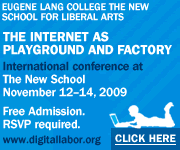 On November 12 through 14, Eugene Lang College The New School for Liberal Arts hosted an international conference titled, “The Internet as Playground and Factory ,” exploring the meaning and changing face of labor in the digital era. The conference inaugurates Lang College’s new conference series, “The Politics of Digital Media.” Schedule.
On November 12 through 14, Eugene Lang College The New School for Liberal Arts hosted an international conference titled, “The Internet as Playground and Factory ,” exploring the meaning and changing face of labor in the digital era. The conference inaugurates Lang College’s new conference series, “The Politics of Digital Media.” Schedule.
Video interviews with participants are available . Video of some of the sessions is below.
Continue reading
 On Nov. 17 2009, in advance of the NYC Council hearing on the same topic, and in conjunction with Web 2.0 Expo, an ‘Oxford Style’ debate was held on advisability of Network Neutrality regulation.
On Nov. 17 2009, in advance of the NYC Council hearing on the same topic, and in conjunction with Web 2.0 Expo, an ‘Oxford Style’ debate was held on advisability of Network Neutrality regulation.
More info: http://tech-debate.com.
Video is below.
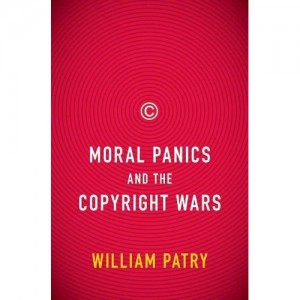 The Intellectual Property Law Society at Cardozo School of Law kicked off its annual program by inviting former faculty member William F. Patry, now Senior Copyright Counsel at Google, to give a lunchtime talk based on his new book – ‘Moral Panics and the Copyright Wars’ (Oxford University Press). Patry is one of the most prolific writers around on the copyright topic having authored the 7-volume “Patry on Copyright” – a definitive work. In the new book he argues that copyright is a utilitarian government program – not a property or moral right. As a government program, copyright must be regulated and held accountable to ensure it is effectively serving its public purpose. The talk was descriptive rather than prescriptive but served to delineate anomalous areas deserving of fixes. Patry also professed a fondness for the simpler schemas of the 1909 act. Video/audio is available below.
The Intellectual Property Law Society at Cardozo School of Law kicked off its annual program by inviting former faculty member William F. Patry, now Senior Copyright Counsel at Google, to give a lunchtime talk based on his new book – ‘Moral Panics and the Copyright Wars’ (Oxford University Press). Patry is one of the most prolific writers around on the copyright topic having authored the 7-volume “Patry on Copyright” – a definitive work. In the new book he argues that copyright is a utilitarian government program – not a property or moral right. As a government program, copyright must be regulated and held accountable to ensure it is effectively serving its public purpose. The talk was descriptive rather than prescriptive but served to delineate anomalous areas deserving of fixes. Patry also professed a fondness for the simpler schemas of the 1909 act. Video/audio is available below.
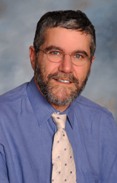 ISOC-NY was pleased to co-sponsor, with the Copyright Society of the U.S.A. NY Chapter, a luncheon program on Oct 22 2009. The speaker was David Post, author of In Search of Jeffersons Moose: Notes on the State of Cyberspace, with whom ISOC-NY members should already be familiar.
ISOC-NY was pleased to co-sponsor, with the Copyright Society of the U.S.A. NY Chapter, a luncheon program on Oct 22 2009. The speaker was David Post, author of In Search of Jeffersons Moose: Notes on the State of Cyberspace, with whom ISOC-NY members should already be familiar.
Audio is here. Video is below.
Continue reading
 What: An ISOC-NY Forum
What: An ISOC-NY Forum
When: Thurs Oct 8 2009 6:45pm – 8:45pm
Where: Warren Weaver Hall NYU
251 Mercer St Rm 317
New York NY 10012
http://cs.nyu.edu/web/Location/directions.html
Who: Dr Milton Mueller; Beau Brendler; Danny Younger
Webcast: http://www.livestream.com/isocny
On Oct 1 2009 the Internet Corporation for Assigned Names and Numbers (ICANN) entered a new era as its Joint Project Agreement (JPA) with the US Government expired and it became an independent global organization. In this forum we will examine the processes, currently in flux, of how we the people will get to participate in this new paradigm.
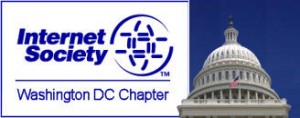 The Washington DC chapter of the Internet Society (ISOC-DC) held a prognostication event on Sep. 15 2009. Speakers included: Leslie Daigle, Chief Internet Technology Officer, Internet Society; Eric Burger, Chief Technology Officer, Neustar; Steve Crocker, Internet pioneer and CEO, Shinkuro, Inc.
The Washington DC chapter of the Internet Society (ISOC-DC) held a prognostication event on Sep. 15 2009. Speakers included: Leslie Daigle, Chief Internet Technology Officer, Internet Society; Eric Burger, Chief Technology Officer, Neustar; Steve Crocker, Internet pioneer and CEO, Shinkuro, Inc.
Video can be found after the jump.
With the deadline for applications for the first round of grants from the $7.2bn set aside for broadband adoption projects in President Obama’s stimulus plan rapidly approaching (Aug14), members of many of NYC communities met to discuss how best to achieve results. Representatives of the City’s Department of Information Technology and Telecommunications (DOITT) poured cold water on many aspirations stating that most, if not all, the cash would go to rural projects. Despite this many declared it their intention to apply.
Audio & Video below. A listserv has been set up for further conversation. Twitter: #nycbtop
Continue reading
Below is video of the NYC Council Committee on Technology’s hearing on Jun 29 2009 regarding proposed Int. 991, Open Data Standards.
 The Open Video Conference is taking place today and tomorrow at NYU. The proceedings, and associated twitters, can be followed live on the website.
The Open Video Conference is taking place today and tomorrow at NYU. The proceedings, and associated twitters, can be followed live on the website.
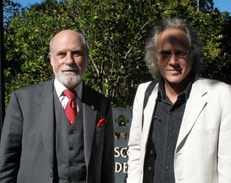 On Nov 11 2008, Stanford campus radio personality Robert Harrison interviewed Vint Cerf on his KZSU program “Entitled Opinions (about Life and Literature)”. Vint recalls his youth as a Stanford undergraduate before describing the genesis of the IP/TCP protocol and prognosticating on the Internet’s future, including Google’s role. He also speculates on time travel, infinite longevity via cyborg integration, and other exotic topics.
On Nov 11 2008, Stanford campus radio personality Robert Harrison interviewed Vint Cerf on his KZSU program “Entitled Opinions (about Life and Literature)”. Vint recalls his youth as a Stanford undergraduate before describing the genesis of the IP/TCP protocol and prognosticating on the Internet’s future, including Google’s role. He also speculates on time travel, infinite longevity via cyborg integration, and other exotic topics.
 Audio and video of Richard Stallman’s recent speech Community vs. Copyright at NYC’s Cardozo School of Law can be found here. Stallman argued that the current copyright regime is incongruous in the digital age, and no longer serves the public interest. He suggested solutions that included new classifications of works and massively reducing the protection period.
Audio and video of Richard Stallman’s recent speech Community vs. Copyright at NYC’s Cardozo School of Law can be found here. Stallman argued that the current copyright regime is incongruous in the digital age, and no longer serves the public interest. He suggested solutions that included new classifications of works and massively reducing the protection period.
Continue reading
 Mar 17 2009 Berkman Center: David G. Post, Stern Professor of Law at the Beasley School of Law at Temple University, discusses questions raised by his recently-published book, In Search of Jefferson’s Moose: Notes on the State of Cyberspace (Oxford), which re-creates Jefferson’s encyclopedia of the New World (“Notes on the State of Virginia,” 1786), but this time for cyberspace. Video below.
Mar 17 2009 Berkman Center: David G. Post, Stern Professor of Law at the Beasley School of Law at Temple University, discusses questions raised by his recently-published book, In Search of Jefferson’s Moose: Notes on the State of Cyberspace (Oxford), which re-creates Jefferson’s encyclopedia of the New World (“Notes on the State of Virginia,” 1786), but this time for cyberspace. Video below.
Continue reading
On Monday March 30 2009 Governor David A. Paterson’s Recovery Cabinet held a Broadband Stimulus Information Session
Downloads of the webcast can be found here – The windows media version appears to have much better audio than the others.
Continue reading
 As part of the IETF 74 meeting in San Francisco, on 24 March the Internet Society organized a panel of experts from industry and other thought leaders on the to discuss the pressing need to adopt Internet Protocol version 6 (IPv6) to ensure the continued growth of the Internet as a platform for innovation.
As part of the IETF 74 meeting in San Francisco, on 24 March the Internet Society organized a panel of experts from industry and other thought leaders on the to discuss the pressing need to adopt Internet Protocol version 6 (IPv6) to ensure the continued growth of the Internet as a platform for innovation.
IPv6 is the next generation Internet Protocol (IP) standard intended to supplement, and eventually replace, the IPv4 protocol most Internet services use today. To help ensure the continued rapid growth of the Internet as a platform for innovation, IPv6 tackles some of IPv4’s shortcomings – most notably a limited amount of remaining addresses. While the technical foundations of IPv6 are well established, significant work remains to deploy and begin using IPv6 capabilities.
Because IPv6 is central to the continued growth and stability of the Internet, the Internet Society is working with its members and other organizations to promote its deployment by sharing information and helping to build the required operational capability among the Internet community.
More information, including panelist bios and slides: http://www.isoc.org/isoc/conferences/ipv6panel/
Continue reading